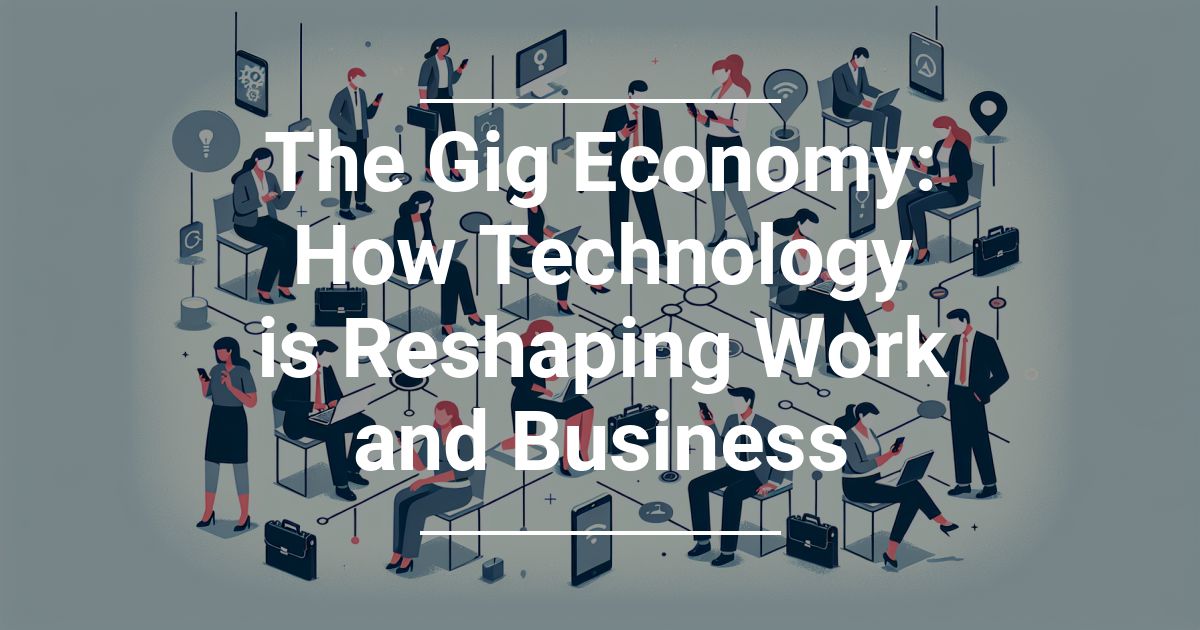
The Gig Economy: How Technology is Reshaping Work and Business
You’ve likely heard musicians, actors, and artists refer to their jobs as gigs, meaning they don’t have a single long-term employer or a traditional work schedule. While freelancing has always existed, the gig economy has surged in popularity, especially with the rise of AI and other technological advancements.
So, what exactly is the gig economy, and how is technology playing a role in reshaping it? Let’s take a closer look at how digital platforms are fostering new opportunities for freelancers and small business owners alike.
What Is the Gig Economy?
The gig economy thrives on digital marketplaces and platforms that connect freelancers with job opportunities. These platforms provide individuals with the flexibility to manage their own schedules, work remotely, and maintain a healthy work-life balance while earning an income.
By leveraging technology, freelancers can connect with clients across industries, and businesses can hire talent as needed without long-term commitments. Let’s explore how the gig economy offers flexibility and benefits to businesses and freelancers alike.
Digital Marketplaces Increase Flexibility
As a small business owner, you might not always have the resources to maintain an in-house team for every task. Whether you need help from marketing experts, IT professionals, or creative writers, hiring gig workers allows you to access specialized skills on a project-by-project basis without the financial commitment of full-time employees.
By using digital platforms, you can post project-based work, receive applications from qualified freelancers, and save on expenses such as travel and meeting costs. This increased flexibility allows you to scale your workforce as needed while cutting down on overhead expenses.
To learn more about how leveraging the gig economy can benefit your business, click here to schedule a discovery call with Lazer IT Consultants.
A Global Talent Pool Improves Options
One of the most significant advantages of technology in the gig economy is the ability to connect with a global talent pool. You’re no longer limited to hiring individuals within your geographic area—instead, freelancers from around the world can apply for your projects, giving you access to a diverse range of skills and perspectives.
Freelancers benefit from these platforms as well, as they can find projects with companies across the globe that match their interests and abilities. This exposure to a variety of industries allows gig workers to develop new skills and expand their professional network, reaching new heights in their careers.
Less of a Commitment for Both Parties
Another benefit of the gig economy is the lower level of commitment for both employers and freelancers. For businesses, this means that if a freelancer doesn’t meet your expectations, you’re only tied to them until the project is complete. You can then look for new talent for future projects without the complexities of long-term contracts.
Freelancers, on the other hand, enjoy the autonomy of choosing their own work. They can decide which projects to take on, how many to manage simultaneously, and when to step back and enjoy work-life balance. This level of freedom is a significant perk for gig workers who prefer flexibility over traditional employment structures.
Conclusion
The gig economy is reshaping how businesses and freelancers work together. With the help of technology, both parties can enjoy increased flexibility, access to a global talent pool, and less long-term commitment. As a small business owner, consider how joining the gig economy can help you tackle your next big project.
Ready to embrace the gig economy and streamline your business operations? Learn more about our project services and discover how technology can help you connect with top-tier talent worldwide.



